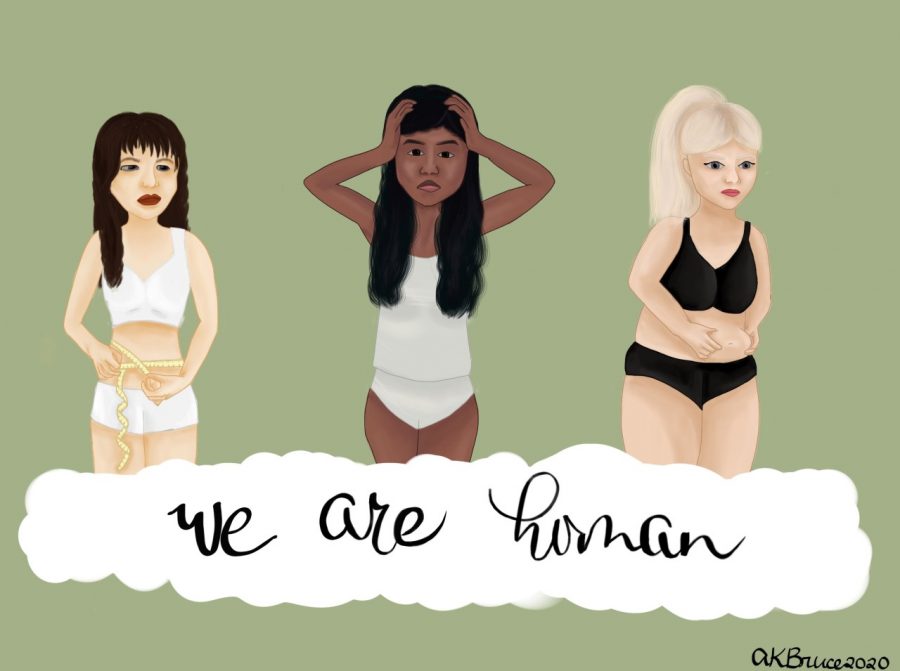We are human: Linfield’s women fight for body positivity
January 26, 2021
Too fat…too thin…too human.. Society spends a lot of the time convincing women they aren’t good enough. Women at Linfield University have had enough. Standing in defiance, The Peer Body Project run by peer educators and facilitators, is working hard to combat body dissatisfaction and prevent eating disorders within Linfield’s community of women.
“We live in a society where women are pushed to look a certain way and there’s so many different standards,” said Abby Gorton, a junior at Linfield and one of the peer educators for the project. “Some people hold onto these standards unfortunately.”
The Peer Body Project, is a strongly empirically supported prevention program, designed to prevent eating disorders and body dissatisfaction that occurs outside of eating disorders. The project is overseen by both Dr. Tanya Tompkins, a psychology professor, and Dr. Amy Orr, a Sociology and Anthropology professor at Linfield University.
Consisting of 4 scripted hour long sessions, each is focused on a different area of prevention and recognition. Participants learn to identify what an appearance ideal is and the costs of such, as well as write letters to the individuals in their past who pressured them to conform to these ideals.
Appearance ideals are the impressions that society presents as the “perfect” way to look, whether that be supermodel thin and blonde or muscular and athletic. Through homework, group activities and discussion, the program challenges the beliefs a lot of women hold regarding their bodies and encourages positive talk about their bodies and feelings among their peers.
Body activism is also extremely important to the project’s mission. Body activism is essentially working to promote healthy body image, while encouraging self-reflection and awareness among self and others. Aiming to bring the community together, peer facilitators and educators within the project also engage their members in dialogue about weight stigma, body image and what health even means.
The concept of health is multifaceted, and can mean different things for different people. For example, some consider “fit” to mean medically-deemed healthy while others consider it to mean thoughts free from self-shame and judgement regardless of body size.
On a larger scale, by the 4th session,The Peer Body Project uses the discourse they have developed within the community. Whether that be just on the university campus or out within McMinnville itself, raising awareness and empowering women is paramount.
“The empowerment I see as an educator of the women that are going through the program is one of my favorite things about it,” said Gorton, who is a psychology major as well as vice president of programming for ASLU.
Learning ways to combat the pressures to conform is a complicated process, but the peer educators and facilitators work together to make sure their members feel supported.
“We want to make sure that women understand that they can be themselves, that they need their body to be how it is, especially now through the pandemic,” said Gorton. In recovery for an eating disorder herself, Gorton has first hand experience in understanding the challenges of body dissatisfaction.
Disordered eating can be anything outside the realm of normal, such as skipping meals and restricting calories; behaviors resembling that of an eating disorder but do not satisfy the requirements for the diagnosis of one. It can lead to a weakened immune system though, which during the pandemic could be deadly.
However, loving your body isn’t always easy. The program instead helps members to shape their often harsh opinions into a more neutral view. “We aim for body neutrality and accepting it, instead of always loving it,” said Nissa Jensen, a senior at Linfield and peer facilitator for the project. “That’s not easy, and it’s something you have to work on every day.”
Jensen, a psychology major as well, has also had experience in dealing with an eating disorder.
While The Peer Body Project is not designed to treat women suffering from eating disorders, the hope is that it will prevent nine in 100 participants who could go on to develop an eating disorder from actually developing one. “As a culture we do not invest in prevention, we put fires out,” Tompkins said.
Professor Tompkins brought the project to Linfield in 2019 by student insistment. “I think it is rare that anyone escapes that ubiccuadious appearance idea, it’s everywhere,” she said. “It starts with playing with Barbie and extends through the media and the social media we consume, to standing waiting for your groceries to be rung up and seeing the magazines where people are either being maligned for being too thin, or others for not losing enough weight, to showing cellulite and having rolls.”
Linfield used to participate in a national college health assessment data gathering taken every other year. Through examining the data around sexual behaviors, alcohol and substance abuse related behaviors, as well as mental health issues and nutrition, Tompkins said as a college “we mimicked high rates of body dissatisfaction.”
Aside from the detrimental physical effects of eating disorders and body dissatisfaction, which can include binging and purging, calorie counting and restricting food intake, the mental toll shouldn’t be taken lightly either. “When we objectify ourselves, we have less capacity to engage fully in life,” supervisor Tompkins said. “It reduces cognitive load when we are constantly surveying our body.”
Although this year is looking a little different because of the pandemic, The Peer Body Project is still actively welcoming members. Using Engage which is accessible through the Linfield website, students can join the organization and can then attend events to see how the program works. General information can also be found on their Instagram page at https://www.instagram.com/linfieldbodyproject/.
“We want to make sure people know however they’re feeling is okay,” said Jensen, in regards to students’ concerns about gaining weight or feeling too stressed to eat during the quarantine. “We don’t have to be mad at our bodies for doing their best to get through this really tough time.”

